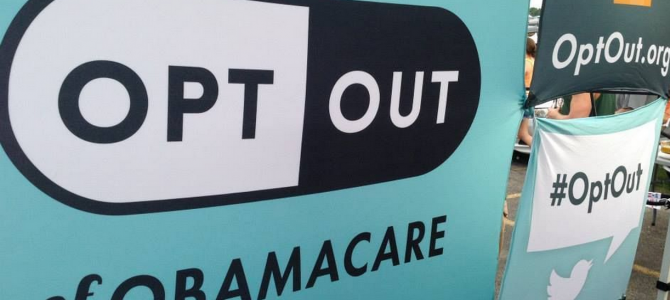
December has arrived, and the deadline to apply for health insurance through the Affordable Care Act that will be effective January 1 is looming large. Recent press accounts suggest the online exchanges are working somewhat better than before, although there are still problems with the federal site and several of the state sites as well.
At the same time that people are being urged to sign up for health insurance by the Obama administration and its allies, others are urging people to ‘opt out’ of Obamacare, particularly the young who are generally being asked to pay much higher premiums than before. A few of the groups urging people not to sign up for health insurance under Obamacare include Generation Opportunity, FreedomWorks, and the Citizens Council for Health Freedom.
I won’t bother repeating the arguments of either side here, I’ll simply note that it’s likely tens of millions of Americans will chose to ‘opt out’ of Obamacare for a variety of reasons. These reasons include not being able to afford health insurance, not finding value in health insurance, and political or ideological opposition to Obamacare. To cite just one source, the Congressional Budget Office estimates that about 30 million people will remain uninsured under Obamacare.
The one thing that is missing from most of the arguments urging people to opt out of Obamacare is what they should do instead. Since most of these messages are aimed primarily at the young, I thought I’d share a bit of info on three individuals I know who fell into the ‘young invincible’ category at one point:
- A former college roommate of mine, age 21 or so when diagnosed with testicular cancer
- Another college friend of mine, age 21 or so when he was severely beaten outside a nightclub and spent several weeks in the hospital
- A close friend of my wife, age 34 or so when she was diagnosed with breast cancer
This isn’t meant to say that young people considering opting out of Obamacare should reconsider. But it does explain, I hope, why I tell people that in my opinion everyone should have some form of coverage against catastrophic medical bills, which isn’t the same as saying everyone should have health insurance.
So, in my view, there’s a right way to opt out of Obamacare and there’s a wrong way to opt out of Obamacare.
Let’s start with the wrong way to opt out of Obamacare. This would be declining to buy health insurance, failing to make other arrangements to pay for catastrophic medical expenses, not shopping for care and paying the ‘list’ price for doctor’s visits and prescription drugs, and simply relying on the emergency room to get needed care in the event of a major injury or illness.
This approach leaves people who opt out vulnerable to sky-high medical expenses at inflated ‘list’ or ‘chargemaster’ rates, and can result in an inability to obtain needed care because of cost. Definitely the wrong way to opt out of Obamacare.
Now for the right way to opt out of Obamacare. Or rather, several of the different right ways to opt out of Obamacare, because there are multiple options to choose from according to your own personal needs and preferences.
First up, protection from major medical bills and getting needed funds to pay for care. Here are a couple of the best options:
- Join a health care sharing ministry. These are voluntary, charitable membership organizations that agree to share medical bills among the membership. They function similar to insurance, and are probably the best alternative to conventional health insurance. There are four of them, at least that I know of. Three are open only to practicing Christians (Samaritan Ministries, Christian Healthcare Ministries, and Christian Care Ministry) while a fourth, Liberty HealthShare, is open to anyone who agrees with their ethical commitment to religious liberty. They operate entirely outside of Obamacare’s regulations, and typically offer benefits for about half the cost of similar health insurance. Members are also exempt from having to pay the tax for being uninsured.
- Buy a short-term health insurance policy. These policies usually last between 1 and 11 months (6 months seem to be standard) and are not regulated under Obamacare, and therefore don’t offer the same high level of benefits that can drive up costs. Deductibles are available that are higher than what is allowed with Obamacare-compliant health insurance, leading to further savings. They can typically be renewed at the end of the policy, although it is a new policy that won’t cover any conditions that occurred under the previous short-term policy. Another limitation is that they often can’t be renewed over and over again, it looks like 3 years of coverage is about the maximum. But they are much less expensive than conventional health insurance, and can be a good option for covering major medical expenses.
- Buy alternative insurance products like fixed-benefit, critical illness, or accident insurance. These policies pay cash in the event you are diagnosed with cancer, spend a night in the hospital, or need some other medical treatment. They cost a fraction of what health insurance costs under Obamacare, and by giving you cash directly you aren’t locked in to any particular provider network. Another thing to do is to max out your medical and uninsured/underinsured driver coverage amounts under your auto insurance policy, which can pay medical bills if you are hurt in a car accident.
There are a handful of other options for funding major medical expenses, things like charity care, medical fundraising, or personal savings, retirement accounts and home equity loans. But none of these should be anyone’s first choice unless they’re a multi-millionaire who doesn’t mind dipping into their bank account to pay for needed treatment.
Once somebody opting out of Obamacare has gotten their alternative coverage arranged, it’s time to shop for health care providers and medical treatment in the event you need it. The first thing to remember is that nearly every price in health care is essentially fake. Insurance companies don’t pay ‘list’ prices, and neither should the self-pay patient. Here are the leading ways to find affordable health care at real prices:
- For primary care, visit cash-only doctors and retail health clinics. These offer up-front pricing that is usually the same or even less than the discounted rates that insurers pay when their customers visit the doctor. If you expect to need to visit a doctor more than a few times a year, you might want to consider joining a direct primary care practice, which for a modest monthly fee will give you nearly unlimited access to a primary care physician.
- Sign up for a telemedicine service. These are low-cost options that provide doctors who can treat relatively simple medical needs by talking with patients over the phone, exchanging e-mails, or visiting via a video connection. They are great for common injuries, conditions, and illnesses, providing convenient care at a low cost.
- For prescription drugs, use generics whenever you can, and be sure to compare prices between different pharmacies. Several of the large chain pharmacies (Walmart, CVS, Target) offer 1-month supplies for $4 for thousands of common generic drugs, and a couple of online sites (GoodRx.com, WeRx.org) allow you to see which pharmacy in your area offers the best deals for your medications.
- For more significant medical needs, such as surgical care, go to a facility that provides up-front ‘package’ pricing for patients paying in cash, like the Surgery Center of Oklahoma and Regency Healthcare. These facilities offer real prices that are typically much less than what most hospitals charge. You can also use a service like MediBid, where doctors bid on providing your treatment.
- In the event you need to go to your local hospital for an emergency or a scheduled treatment, work with a medical bill negotiation service to get the best price possible. Hospitals typically charge wildly inflated ‘chargemaster’ prices to people without conventional health insurance, usually between three and five times more than what an insurer would pay for the exact same service. You can also try to negotiate on your own by using a service like Healthcare Blue Book or Pricing Healthcare to find out what insurers are paying, but be prepared to put a lot of time and effort into it if you do.
There is also the matter of the tax for being uninsured. Two things to keep in mind: there are a couple of exemptions you may qualify for, and the tax is for many people going to be less than the cost of paying premiums for conventional health insurance.
The first exemption, mentioned briefly above, is for members of health care sharing organizations. Even though they aren’t technically insurance, they do provide coverage and Congress chose to exempt members from having to pay the tax for being uninsured.
There’s also an exemption for people who find that premiums are unaffordable, at least by the government’s definition. If the least-expensive Bronze plan in your area costs more than 8% of your adjusted gross income, you’re exempt from the tax.
Otherwise, you’ll be taxed 1 percent of your adjusted gross income in 2014 if you’re uninsured, rising to 2.5% by 2016. So someone with an $80,000 income in 2014 will owe an $800 tax, even if they have a fixed-benefit policy, short-term policy, or some other alternative that isn’t membership in a health care sharing organization.
One caveat, however: the IRS can only collect the tax by reducing your tax refund. So, no refund equals no tax. I’m not necessarily suggesting this as a tax strategy (irritating the IRS just seems like a bad idea on a number of levels), and it won’t surprise me at all to see Congress one day try to ‘fix’ this little loophole. But as the law stands right now, and as the IRS itself has posted, the only way they have to collect the tax is by taking it from your refund, so if you don’t have a refund coming back to you there is no way the IRS can force you to pay the tax.
There are a lot more options for anybody opting out of Obamacare and needing access to affordable health care, which I write about regularly here at The Self-Pay Patient blog and that fill my soon-to-be-released book (naturally, titled The Self-Pay Patient, coming out later this month). But hopefully the information here can help people see that there are plenty of options for affordable health care and financial protection from catastrophic medical expenses if they decide to opt out of Obamacare.
Deciding to opt out of Obamacare is a fairly serious decision. But there’s another decision that people who want to opt out need to make, and that is whether they want to do it the right way by doing a little planning and knowing their options, or the wrong way which would be just to opt out and not give the matter any more thought until they’re on the way to the hospital with a busted leg or notice a lump in their breast.
Hopefully anybody considering opting out of Obamacare will take the time to know their options and become savvy self-pay patients, instead of patients who are completely unprepared to find the affordable healthcare they are likely to need at some point.
Sean Parnell blogs on affordable health care options for people who pay directly for treatment at The Self-Pay Patient. This blog post originally appeared there in modified form on December 3, 2013.









